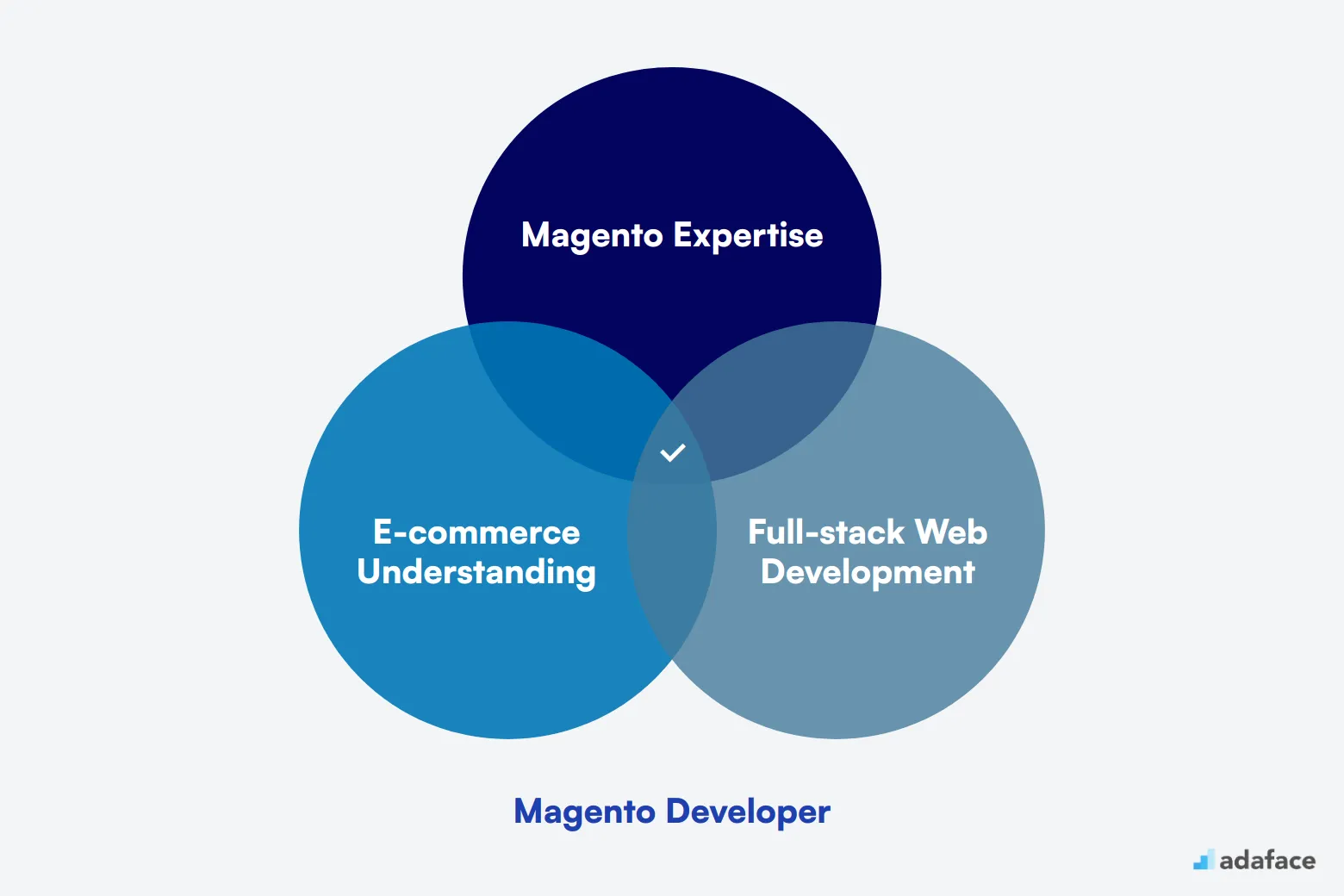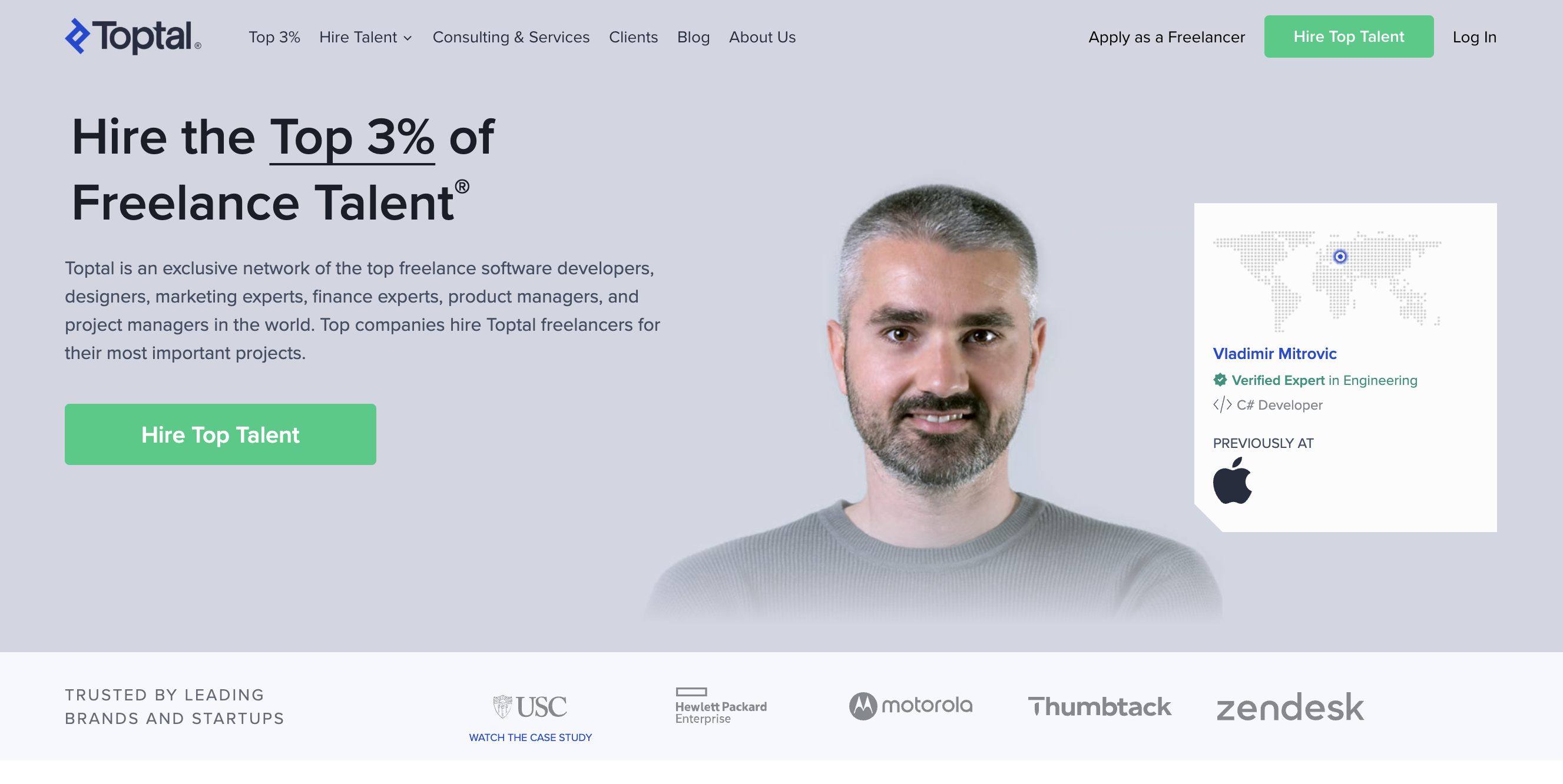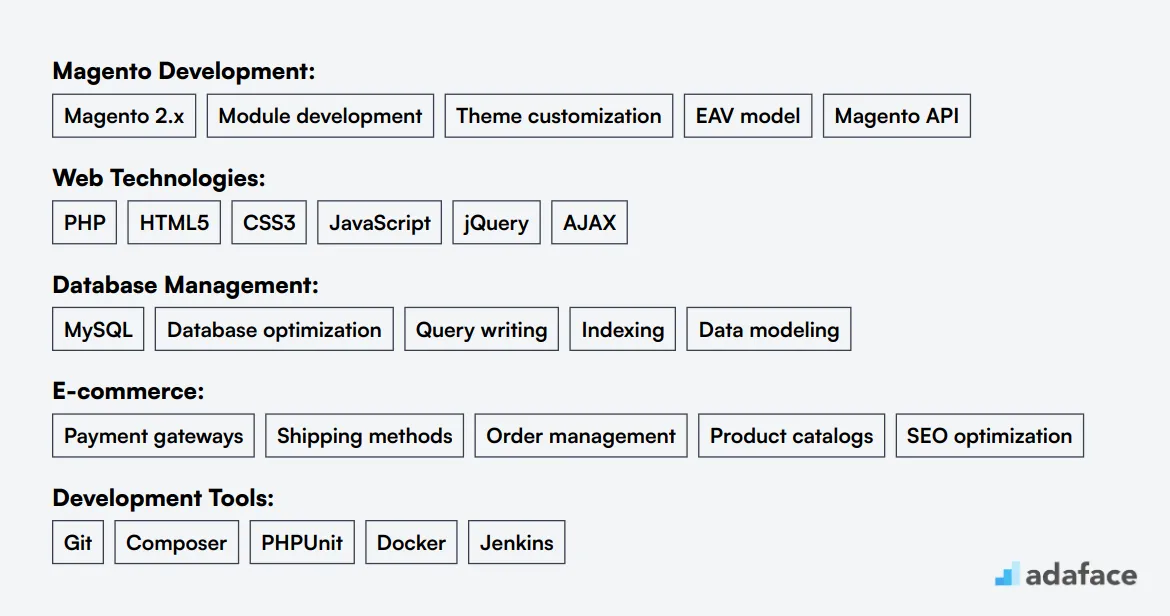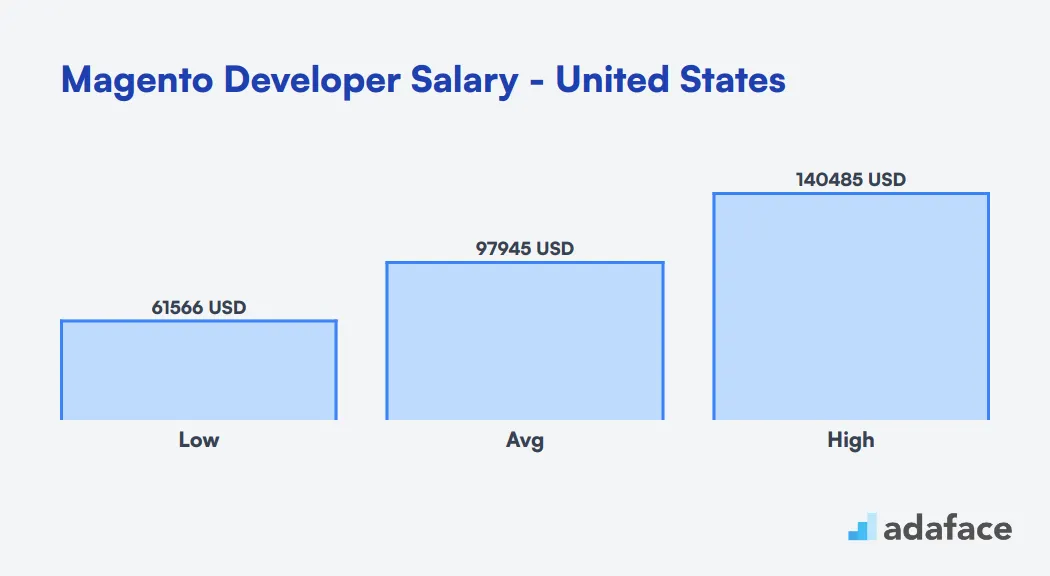Hiring a Magento developer can be a game-changer for e-commerce businesses, but many recruiters stumble in the process. The key is to understand that Magento expertise goes beyond basic coding skills. You need someone who can navigate the platform's complexities, optimize performance, and create seamless user experiences. Often, companies make the mistake of hiring based on general web development skills alone, missing out on Magento-specific expertise.
This guide will walk you through the entire process of hiring a top-notch Magento developer. From understanding the role to conducting effective interviews, we've got you covered. We'll also show you how to use Magento skills assessment tests to evaluate candidates objectively and ensure you're making the right choice for your team.
Table of contents
Why Hire a Magento Developer?
Hiring a Magento developer can solve specific e-commerce challenges your business faces. For instance, you might need to improve your online store's performance, customize features, or integrate third-party services seamlessly.
Consider these common scenarios where a Magento developer adds value:
- Optimizing site speed and user experience
- Implementing complex payment gateways
- Creating custom modules for unique business requirements
If you're consistently facing Magento-related issues or planning a major e-commerce overhaul, it's time to bring a full-time developer on board. For smaller projects or periodic updates, working with a Magento developer on a contract basis might be more suitable.

What does a Magento Developer do?
A Magento Developer specializes in creating and maintaining e-commerce websites using the Magento platform. They ensure that online stores are visually appealing, reliable, and offer a seamless user experience for customers navigating the site.
Their daily tasks include designing and developing new features for e-commerce platforms, which involves writing and testing code. They also troubleshoot and resolve issues as they arise to maintain smooth operations. Additionally, Magento Developers collaborate closely with clients and other team members to understand requirements and deliver customized solutions. For further insights on the skills required, you can refer to this blog post about Magento Developer skills.
Magento Developer Hiring Process
The hiring process for a Magento developer typically takes around 1-2 months. Here's a quick overview of the timeline:
- Prepare an accurate Magento Developer Job Description and post it on relevant job boards.
- Expect resumes to start coming in within the first 3-4 days.
- Shortlist candidates based on their resumes and move to the skill testing stage. This process can take about a week.
- Conduct interviews with the shortlisted candidates and make the final hiring decision.
While the overall process may take 1-2 months, the timeline can vary depending on the urgency and the number of candidates. We'll cover each step in detail, along with useful resources and checklists.
Skills and qualifications to look for in a Magento Developer
Creating an ideal candidate profile for a Magento Developer requires a clear understanding of both technical skills and e-commerce knowledge. It's important to differentiate between must-have skills and nice-to-have qualifications, as these can vary based on your specific project needs and team structure.
When building your skills assessment for Magento Developers, consider the following key areas:
- Magento Expertise: Proficiency in Magento framework, module development, and theme customization
- Web Technologies: Strong skills in PHP, HTML, CSS, and JavaScript
- Database Management: Experience with MySQL and query optimization
- E-commerce Understanding: Familiarity with payment gateways, shipping methods, and product catalogs
- Development Tools: Knowledge of version control systems and testing frameworks
Remember, while technical skills are important, soft skills like problem-solving and communication are equally valuable for a successful Magento Developer.
| Required skills and qualifications | Preferred skills and qualifications |
|---|---|
| Proficiency in PHP and Magento framework | Magento certification |
| Experience with HTML, CSS, and JavaScript | Experience with REST API and web services |
| Knowledge of MySQL and database management | Knowledge of frontend technologies like jQuery and React |
| Familiarity with version control systems (e.g., Git) | Familiarity with Agile development methodologies |
| Strong problem-solving and debugging skills | Experience with cloud platforms (e.g., AWS, Azure) |
How to Write an Effective Magento Developer Job Description
Crafting a compelling Magento Developer job description is key to attracting top talent. Here are some quick tips to help you create a standout JD:
• Highlight key responsibilities: Clearly outline the developer's role in customizing Magento platforms, integrating third-party systems, and optimizing website performance. Mention specific projects they'll work on to give candidates a clear picture of their potential impact.
• Balance technical and soft skills: While listing technical requirements like PHP, MySQL, and Magento certification, don't forget to emphasize soft skills such as problem-solving, communication, and teamwork. A well-rounded Magento developer should excel in both areas.
• Showcase your company's USP: Highlight what makes your e-commerce business unique. Whether it's cutting-edge projects, opportunities for growth, or a supportive team culture, these details can set you apart and attract the best Magento talent.
Top Platforms to Hire Magento Developers
Once you've crafted a solid job description, the next step is to find the right job listing platforms for sourcing Magento developers. Choosing the right platform can significantly impact the quality and speed of your recruitment process. Here are three of the best platforms to consider.
LinkedIn Jobs
Ideal for posting full-time Magento Developer positions. Large professional network allows for targeted job listings and easy candidate search.

Indeed
Widely used job board suitable for posting various Magento Developer roles. Offers resume search and applicant tracking features.

Toptal Magento Developers
Platform for hiring top-tier freelance Magento developers. Rigorous vetting process ensures high-quality candidates for project-based work.

In addition to the above, you might want to explore platforms like Upwork and Toptal, both excellent for freelance Magento developers. If you're hiring full-time, LinkedIn Jobs and Dice provide access to a broad network of tech professionals. For remote work, We Work Remotely is a great option, while AngelList Jobs connects startups with entrepreneurial talent. Don't overlook Glassdoor for its dual purpose of job listings and company reputation showcase, or Stack Overflow Jobs for its developer-focused audience. For more tips on remote hiring, check out our remote hiring guide.
How to screen Magento Developer resumes?
Screening resumes is an important step in hiring a Magento Developer because it helps narrow down the pool of candidates to those who meet your specific needs. This process saves time and ensures that only the most qualified applicants advance to the interview stage.

To manually screen resumes, focus on recognizing key skills and qualifications. Look for primary keywords like 'Magento 2.x', 'PHP', 'MySQL', and 'Git'. These keywords indicate a candidate's proficiency in necessary areas. The aim is to quickly sort out those who lack these foundational skills, thus streamlining your hiring process.
Another approach is using AI language models to screen resumes. Tools like AdaFace's online assessment platform can highlight resumes that contain all necessary keywords. By feeding a tailored prompt to AI, you can efficiently filter candidates who align with your requirements.
Here's a sample AI prompt you can use:
TASK: Screen resumes to match job description for Magento Developer role
INPUT: Resumes
OUTPUT: For each resume, provide following information:
- Email id
- Name
- Matching keywords
- Score (out of 10 based on keywords matched)
- Recommendation (short recommendation of whether to shortlist this candidate or not)
- Shortlist (Yes, No or Maybe)
RULES:
- If you are unsure about a candidate's fit, put the candidate as Maybe instead of No
- Keep recommendation concise.
KEYWORDS DATA:
- Magento (2.x, Module development, Theme customization)
- Web Technologies (PHP, HTML, CSS, JavaScript)
- Database (MySQL, Optimization, Query)
Recommended Skills Tests to Screen Magento Developers
Skills tests provide an objective measure to gauge a candidate's capabilities beyond their resume. For hiring managers seeking Magento developers, these assessments can identify whether candidates have the necessary technical expertise. Here are some recommended skills tests:
Magento Online Test: Evaluate a candidate's proficiency in Magento development, including their understanding of the platform's features and ability to customize e-commerce solutions effectively. Magento Online Test
PHP Online Test: Since Magento is built on PHP, assessing a developer's PHP skills is essential. This test helps determine their ability to write and troubleshoot code in the language that forms the backbone of Magento. PHP Online Test
JavaScript Online Test: Front-end skills are just as important for Magento developers. This test measures their ability to use JavaScript for creating dynamic and interactive web applications. JavaScript Online Test
MySQL Online Test: Magento developers must work with databases, making MySQL skills crucial. This test assesses their ability to manage and optimize database interactions. MySQL Online Test
Ecommerce Analytics Test: While not a direct coding test, understanding e-commerce analytics can provide insights into how a developer can optimize Magento stores for better user experience and sales. Ecommerce Analytics Test
Case Study Assignments to Hire Magento Developers
Case study assignments can be valuable for assessing Magento developers, but they come with drawbacks. They're often time-consuming, which can lead to lower completion rates and potentially losing good candidates. Despite these challenges, well-designed case studies can provide insights into a candidate's problem-solving skills and Magento expertise.
Magento Store Optimization: This case study asks candidates to analyze an existing Magento store and propose optimizations for performance, user experience, and SEO. It tests their ability to identify issues and suggest practical solutions within the Magento ecosystem.
Custom Module Development: Candidates are tasked with creating a custom Magento module to add specific functionality to an e-commerce site. This assignment evaluates their coding skills and understanding of Magento's architecture and best practices.
Theme Customization Challenge: This case study focuses on front-end development, requiring candidates to customize a Magento theme to meet specific design requirements. It assesses their HTML, CSS, and JavaScript skills, as well as their familiarity with Magento's theming system.
How to Structure Technical Interviews for Magento Developers
After candidates pass the initial Magento developer skills test, it's time for technical interviews to assess their practical abilities. While skills tests are great for initial screening, technical interviews help identify the best-fit candidates for your specific role. Let's look at some key questions to ask during these interviews.
Consider asking: 1) 'Can you explain Magento's architecture?', 2) 'How would you optimize Magento performance?', 3) 'What's your experience with custom module development?', 4) 'How do you handle version control in Magento projects?', and 5) 'Can you walk us through your process for troubleshooting a Magento issue?'. These questions help evaluate the candidate's understanding of Magento's core concepts, problem-solving skills, and real-world experience with the platform.
Cost of Hiring a Magento Developer
The cost of hiring a Magento Developer varies based on experience, location, and project requirements. On average, Magento Developers in the United States earn around $97,946 per year.
Salaries can range from $61,567 to $140,486, with significant variations between cities. For example, in Dallas, TX, the average salary reaches $151,198, while in New York, NY, it's about $101,250.
Magento Developer Salary in the United States
The average salary for a Magento Developer in the United States is around $97,946 per year. Salaries can range from a low of $61,567 to a high of $140,486, depending on experience and location.
For instance, in cities like Dallas, TX, the average salary can reach $151,198, while in New York, NY, it hovers around $101,250. This indicates the significant impact that location has on salary expectations.

What's the difference between a Magento Frontend Developer and a Magento Backend Developer?
Many recruiters often confuse Magento Frontend Developers with Magento Backend Developers because they both operate within the Magento ecosystem. However, their roles are quite distinct, focusing on different areas of the application.
A Magento Frontend Developer is primarily concerned with the user interface and experience. They work with technologies like HTML, CSS, JavaScript, and LESS/SASS for theme development and UI components. They optimize frontend loading speed and ensure designs are responsive. Collaborating with UX designers and content creators, they focus on integrating third-party frontend tools and conducting cross-browser and UI/UX testing.
In contrast, a Magento Backend Developer focuses on server-side logic and database management. They use PHP, MySQL, and REST API to develop modules and work with the EAV model. Performance optimization here involves improving database queries and implementing caching mechanisms. They often collaborate with system administrators and database administrators to integrate payment gateways and ERP systems, while handling unit and integration testing.
For more insights on the skills required for a Magento Developer, you can refer to this guide.
| Magento Frontend Developer | Magento Backend Developer | |
|---|---|---|
| Primary Focus | User interface and experience | Server-side logic and database management |
| Key Technologies | HTML, CSS, JavaScript, LESS/SASS | PHP, MySQL, REST API |
| Magento-specific Skills | Theme development, UI components | Module development, EAV model |
| Performance Optimization | Frontend loading speed, responsive design | Database queries, caching mechanisms |
| Integration Focus | Third-party frontend tools, JavaScript libraries | Payment gateways, ERP systems |
| Testing Expertise | Cross-browser testing, UI/UX testing | Unit testing, integration testing |
| Typical Certifications | Adobe Certified Expert - Magento Commerce Frontend Developer | Adobe Certified Expert - Magento Commerce Backend Developer |
| Collaboration | UX designers, content creators | System administrators, database administrators |
What are the ranks of Magento Developers?
When hiring Magento developers, it's important to understand the different ranks within this role. Many people often confuse these ranks with similar tech positions, leading to misaligned expectations and hiring challenges.
• Junior Magento Developer: This entry-level position focuses on basic development tasks and learning the Magento platform. Junior developers typically work under the supervision of senior staff and contribute to small features or bug fixes.
• Magento Developer: A mid-level developer has a good grasp of Magento's functionalities and can handle complex development tasks independently. They are often responsible for implementing features and maintaining the existing codebase.
• Senior Magento Developer: This rank is for experienced professionals who lead projects and mentor junior developers. Senior developers possess deep knowledge of Magento architecture and best practices, ensuring quality and performance in the solutions they deliver.
• Magento Solutions Architect: At this level, the role expands to strategic planning and system design. Solutions architects work closely with stakeholders to devise comprehensive solutions that align with business goals and technical requirements.
• Magento Technical Lead: This top-tier role involves overseeing development teams and managing project execution. Technical leads ensure that best practices are followed and that the development process runs smoothly, serving as a bridge between management and developers.
Hire the Best Magento Developers
In this guide, we've covered the key aspects of hiring Magento developers, from understanding their role to structuring effective interviews. We've explored the skills to look for, how to write compelling job descriptions, and the best platforms to find talent.
The most important takeaway is to use accurate job descriptions and skills tests to make your hiring process more precise. By combining these elements, you'll be well-equipped to find the right Magento developer for your team, ensuring your e-commerce projects are in capable hands.
Magento Online Test
FAQs
Look for proficiency in PHP, JavaScript, HTML/CSS, MySQL, and experience with Magento's specific architecture. Knowledge of e-commerce best practices and familiarity with Magento extensions are also valuable. Check out our detailed guide on Magento developer skills for more information.
Use a combination of Magento-specific coding tests, technical interviews, and practical assignments. Consider using platforms like Adaface that offer tailored Magento developer assessments to evaluate candidates objectively.
Look for Magento developers on specialized job boards, LinkedIn, GitHub, and Magento community forums. Attending Magento events and conferences can also be a great way to network and find talented developers.
Magento 2 developers should have experience with newer technologies and architectural changes introduced in Magento 2. They should be familiar with concepts like UI components, dependency injection, and the new file structure. Magento 1 skills are still relevant for maintaining legacy systems, but for new projects, focus on Magento 2 expertise.
Magento certification can be a good indicator of a developer's expertise, but it shouldn't be the only criterion. Look for a combination of certification, practical experience, and problem-solving skills. Some excellent developers may not be certified, so consider the overall skill set and portfolio.
Include specific Magento-related responsibilities, required technical skills, experience level, and any industry-specific knowledge. Mention the Magento version you're working with and any particular projects or challenges they'll face. For a detailed template, check our Magento developer job description guide.
Use case study assignments or scenario-based questions during the interview process. Present real-world Magento development challenges and ask candidates to explain their approach. This will give you insight into their problem-solving abilities and Magento-specific knowledge.

40 min skill tests.
No trick questions.
Accurate shortlisting.
We make it easy for you to find the best candidates in your pipeline with a 40 min skills test.
Try for freeRelated posts
Free resources



